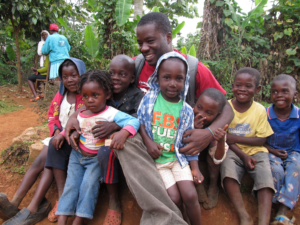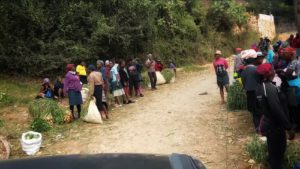The following are frequently asked questions regarding Words In Action Haiti and the community of Qui Croit.
What is Qui Croit?
Qui Croit is a small rural village in the southeastern mountains of Haiti. As the crow flies Qui Croit is about 8 miles south of Port-au-Prince, Haiti’s capital city. Words In Action Haiti founder, Claude Louis, grew up in this village and has dedicated much of his adult life to improving the quality of life for the families who live in and around this village. We estimate that the clinic that he started serves roughly 40,000 people in the surrounding area.

How do you pronounce “Qui Croit” in English?
The French name “Qui Croit” is pronounced “Key Kwah”
How do you spend donation money?
With the exception of overhead costs such as transaction fees to PayPal, web hosting, and registration costs all donation money is spent in Haiti on projects and items that directly support our mission. The majority of funds thus far have gone toward building the clinic, constructing the cistern, purchasing medications and supplies, paying tuition costs for students in Qui Croit, and providing a monthly salary for our nurse, Marimise.
Claude & the rest of us in the United States volunteer our time and money. When visiting Haiti we individually fund our own plane tickets, accommodations, food, and split the cost of gas money and rental vehicles. Several team members volunteered their time and skills to get this website up and running and one of our team members even took some courses at a local technical college this past year to help her serve the people of Qui Croit more effectively!
How do the people in Qui Croit make a living?
Subsistence farming. Most families in Qui Croit are farmers who grow enough food for themselves and sell the extras at a market near Kenscoff.

Does the clinic have Internet access?
Not at the moment, though we could easily gain Internet access by purchasing a wireless cellular hotspot. It would need a consistent power source, however, which is not feasible at this time.
Are there cell phones in Haiti?
Yes. Millions of Haitians have cell phones and the cell phone reception in the mountains of Qui Croit is pretty good.
What language do people speak in Qui Croit?
Haiti has two official languages: Haitian Creole & French. Children in Qui Croit grow up learning Haitian Creole which is what their parents speak and understand. This creates a problem when they get to school as the vast majority of Haitian textbooks are written in French. French and Haitian Creole are similar but different enough to become a roadblock to learning. Those students who are able to quickly learn French are the ones who typically perform the best in school.
So why doesn’t the school just buy textbooks that are written in Haitian Creole? Because they don’t exist. Haitian Creole is the primary spoken language while French is the primary written language. Simply put, authors write their textbooks in French.
Is there electricity in Haiti?
Yes, but not everywhere and not always 24/7. Cities like Port-au-Prince (Haiti’s capital), Kenscoff, and Petion-Ville have access to the local power grid. City power is not the most reliable, however. For example, the Baptist Haiti Mission hospital in Fermathe has a generator that is used when the Fermathe city power is turned off (usually around 5:30pm each evening, though there is not an official time.)
In the mountain village of Qui Croit, our clinic has a small generator available but it runs only when necessary, usually when doctor teams are visiting the clinic (once every few months). It does not run every day and is fueled with regular unleaded gasoline. Like all major buildings in Haiti, the clinic is wired with 120 volt outlets and light sockets, the same ones you would find in a typical home in the United States. During our November 2017 visit the clinic didn’t have any light bulbs so we plugged in Jeremiah’s photography lights to illuminate the rooms where our doctor team would see patients.
The church and school in Qui Croit have a similar setup. They are wired for lights but the lights are not used during the day. The typical house in Qui Croit has no electricity and will likely not have access to a public grid for the foreseeable future. In several of the surrounding villages there may be a Haitian who owns a solar panel which he/she will rent out to neighbors who want to charge their cell phones.

Where is your clinic in Haiti?
Here is a link to our clinic on Google Maps:
https://goo.gl/maps/VQaBL7gwx872




